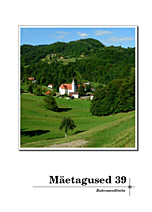Andreas Arvidi disputatsioon De natura et constitutione medicinae arstiteadusliku mõtte arengu peegeldajana 17. sajandi Tartu ülikoolis
De natura et constitutione medicinae by Andreas Arvidi as a Mirror of Medical Thought at the 17th Century University of Tartu
Author(s): Kaarina ReinSubject(s): Customs / Folklore
Published by: Eesti Kirjandusmuuseum
Keywords: 17th century disputations; history of medicine; medical education at the University of Tartu in the Swedish period; "Stregensis" by Andreas Arvid; studying at Academia Gustaviana Dorpatensis
Summary/Abstract: The present article deals with a medical disputation, written and defended at the University of Tartu during its first period of activity in the 17th century, when the university was called Academia Gustaviana. More precisely, under investigation is the disputation of the Swedish poetry theorist Andreas Arvidi (ca 1620–1673), De natura et constitutione medicinae and its context. The medical education was at the insufficient level at most 17th-century universities in Europe and this was the case at the University of Tartu as well. There were very few students of medicine at the University of Tartu during the Academia Gustaviana period (eight, all in all) compared to the whole number of students (1056) during that time. Only two of these eight students were afterwards active as physicians. There were but few medical disputations defended during the Academia Gustaviana period, of which two were solely medical, supervised by the professor of medicine Sebastian Wirdig. The first of these, the disputation by Andreas Arvidi, deals with medicine in general. Andreas Arvidi was not a medical student but studied natural sciences at the University of Tartu. As a person of great talent, he debated on a variety of themes, including astronomy, mathematics, botany, medicine and ethics. His disputation De natura et constitutione medicinae is explaining the meaning of the word ‘medicine’ by exposing its etymology and providing synonyms and homonyms to this word. In defining medicine he quotes Jean Fernel, the famous French Renaissance physician. Then he discusses the reasons and purposes for inventing medicine and finally presents the systematisation of medicine. The whole work reveals the author’s brilliant knowledge of Greek and Roman authors, as well as of contemporary medical authorities. Of the latter ones, iatrochemist Daniel Sennert, professor at Wittenberg University, has been quoted on several occasions, which implies to the fact that Sennert was an authority in the 17th-century Faculty of Medicine in Tartu. Andreas Arvidi’s disputation De natura et constitutione medicinae is a work that gives the broadest overview of medical thought at the University of Tartu in the 17th century.
Journal: Mäetagused. Hüperajakiri
- Issue Year: 2008
- Issue No: 39
- Page Range: 7-28
- Page Count: 22
- Language: Estonian

